THE WALL PERFORMANCES
An indepth and fascinating look at the live 1980 and 1981 concerts by Paul Powell Jr.
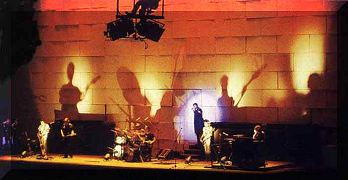 "Whoa,
whoa, whoa, stop, stop, stop the film! We've decided the best thing
would be is to put this fire we have up here out!" These were Roger
Waters' impassioned words as he froze the premier Wall show at the Los
Angeles Sports Arena. Ashes falling from above were not just another
special effect, instead the curtains were smoldering from the battery
of fireworks punctuating the opening of "In The Flesh". "Whoa,
whoa, whoa, stop, stop, stop the film! We've decided the best thing
would be is to put this fire we have up here out!" These were Roger
Waters' impassioned words as he froze the premier Wall show at the Los
Angeles Sports Arena. Ashes falling from above were not just another
special effect, instead the curtains were smoldering from the battery
of fireworks punctuating the opening of "In The Flesh".
As the
fire crew doused the flames, the most ambitious spectacle ever staged
in rock music sat frozen. After the fire was extinguished and nerves
calmed, the show resumed. The film was restarted as David shuffled to
his cues, Roger egged the crowd back into their wide-eyed enthusiasm
and the band cranked back into "Empty Spaces". Showbiz Pink Floyd
style...
Fans who came to The Wall weren't
to witness just another rock concert; instead they found themselves
part of a multimedia show so grandiose it would come crashing down on
itself as a finale. Roger's visions of alienation and oppression were
packed with metaphor. His story led fans down a nightmarish journey
into the heart of darkness. In all its misanthropic loathing and
cinematic excess, his point would become abundantly clear.
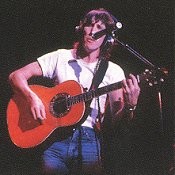 In
one man's soul this live concert experience was akin to a battleground,
a mass of humanity swirled into a dervish frenzy by the primitive pulse
of Rock'n'Roll. In his reaction to the war-zone and the dehumanization
that occurs at such events, The Wall expressed his concern that the
messages and emotions painted in Pink Floyd's music were getting lost
in the event's grand scale. A spectacle he himself helped create as the
group's popularity grew well beyond the hushed reverence fans used to
give them in the old days. In
one man's soul this live concert experience was akin to a battleground,
a mass of humanity swirled into a dervish frenzy by the primitive pulse
of Rock'n'Roll. In his reaction to the war-zone and the dehumanization
that occurs at such events, The Wall expressed his concern that the
messages and emotions painted in Pink Floyd's music were getting lost
in the event's grand scale. A spectacle he himself helped create as the
group's popularity grew well beyond the hushed reverence fans used to
give them in the old days.
Playing the protagonist, Roger
led the listener, and now the viewer, down a partly autobiographical
and partly fictional story of Pink - the tortured rock star. Characters
came to life in the form of a robust inflatable mother, a 30 foot high
teacher puppet, an insidious scorpion wife and various animated
characters like the brutal judge. Encasing and framing all this was the
wall itself - all 420 white polystyrene bricks of it.
The mechanics of putting on The
Wall were staggering. Set designers Mark Fisher and Jonathan Park were
responsible for the engineering and logistics of the project. Besides
the construction of a 160 foot by 35 foot prison, there were three 35mm
film projectors synchronizing images, an ultra-refined surround-sound
system,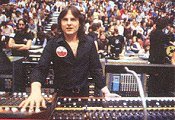 tape
machines with music and sound effects (four to play and one to record),
Midas mixing consoles with 116 input channels and rack upon rack of
signal processing and special effects units requiring six engineers to
operate. Floyd sound aces James Guthrie and Chris Thomas headed the
sound production team. tape
machines with music and sound effects (four to play and one to record),
Midas mixing consoles with 116 input channels and rack upon rack of
signal processing and special effects units requiring six engineers to
operate. Floyd sound aces James Guthrie and Chris Thomas headed the
sound production team.
Banks of Phase Linear and Altec
amplification hooked to each speaker position provided 106dB of
absolutely clean sound. There were puppets, dirigibles and props to
control, two hydraulic lighting cranes, as well as hydraulic lifts for
The Wall builders and two seperate stage set-ups, for in front of the
wall and behind it complete with monitors and lighting rigs.
Onstage, supplementing the Floyd,
were four backup singers and four additional musicians starring as the
surrogate band. Each musician had a full compliment of instruments and
amplifiers with effects units as well as their own monitors feeding the
music, tapes and click-tracks.
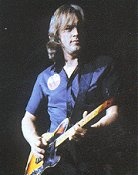 An
eighty man crew acted on cue to keep the performances in sync, as most
performances clocked right in near two hours. Each venue had mobile
offices and a crew canteen moved in to provide nurishment on-site.
David was musical director with a stack of music and sound effect cues
while Roger, armed with a wireless microphone, was in character as
Pink. All of this in more controlled and smaller venues as Roger liked
it. The Floyd and their crew managed to turn over 100 tons of equipment
into rock theatre far surpassing even their own past achievements. An
eighty man crew acted on cue to keep the performances in sync, as most
performances clocked right in near two hours. Each venue had mobile
offices and a crew canteen moved in to provide nurishment on-site.
David was musical director with a stack of music and sound effect cues
while Roger, armed with a wireless microphone, was in character as
Pink. All of this in more controlled and smaller venues as Roger liked
it. The Floyd and their crew managed to turn over 100 tons of equipment
into rock theatre far surpassing even their own past achievements.
The Wall shattered all fans
expectations. They watched as the group disappeared slowly behind
bricks until by the second half the wall stood like a monument before
them. The bricks themselves represented the psychological barriers
erected to shield the human organism from the ebb and flow of daily
existence.
Fortunately the vast structure
itself became a film screen for Gerald Scarfe's surreal and bizarre
animation of passionate flowers, a predatory eagle, glistening and
hungry worms, children minced into sausage meat, a landscape of bloody
crosses and ghostly soldiers, marching hammers in formation, and a
perverse judge.
Musically the Floyd were as
precise as a click-track with no room for random improvisation like in
previous years. The opening In The Flesh? was punctuated with a
Spitfire airplane prop crashing into The Wall sending balsa wood and
sparks flying. Presented as a sarcastic parody, it wasn't even Pink
Floyd but a surrogate band. By The Thin Ice both bands were on stage
together.
Doubling and seperating
instrument duties had advantages. Roger's hands were free from playing
bass full time, giving the job to Andy Bown. This allowed him to
concentrate on singing and acting. David had his attention fragmented,
acting as musical director in addition to the role of vocalist and
guitarist, the latter job gladly shared with a former Floyd sideman
Snowy White.
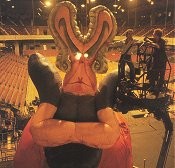 Roger
later contended Willie Wilson was needed onstage to help Nick keep time
and Peter Woods was the additional keyboardist alongside Richard
Wright. This instrumental prowess gave the music a fully refined sound,
very evident on Another Brick In The Wall Part 2 as a 30 foot tall
teacher puppet danced from the rafters while Pink Floyd played an
extended version of the song. Roger
later contended Willie Wilson was needed onstage to help Nick keep time
and Peter Woods was the additional keyboardist alongside Richard
Wright. This instrumental prowess gave the music a fully refined sound,
very evident on Another Brick In The Wall Part 2 as a 30 foot tall
teacher puppet danced from the rafters while Pink Floyd played an
extended version of the song.
The Wall continued to grow as an
inflated mother image grew while David and Roger harmonized together
during Mother. The voices of Jon Joyce, Stan Farber, Jim Haas, and Joe
Chemay, made Goodbye Blue Sky one of the exceptional showcases of their
"Beach Boy" style harmonies.
Gerald Scarfe's botanical sex
animation came alive on the circular screen during Empty Spaces and for
the first time listeners got to hear What Shall We Do Now (missing from
the album). During the first few performances the band would crank into
a classic blues workout (sometimes called Almost Gone) after Another
Brick Part 2, mostly to allow the wall builders to catch up before the
next song. By Goodbye Cruel World, the band had blocked off all contact
with the audience as one final brick walled them in. This barrier left
viewers cold and confused, perhaps a bit psychologically numb waiting
for human contact.
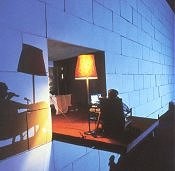 In
the second half, The Wall stood completed, vast, cold and impenetrable.
Hey You was sung behind the wall as a plea for contact as the worms of
moral decay have begun to eat into the nerve fibres of Pink's sanity.
The Wall opened up during Nobody Home to reveal a complete hotel room
for Roger's acting and reflection. High atop The Wall, David played his
blistering guitar solo in Comfortably Numb as his immense shadow was
cast across the audience. Again, the Master of Ceremonies came out to
introduce the band for In The Flesh, now with the full band back in
front of The Wall complete with a new hanging lighting rig. Later, for
Run Like Hell, a dark pig with search-light eyes loomed over the
audience with crossed hammers painted on its side. In
the second half, The Wall stood completed, vast, cold and impenetrable.
Hey You was sung behind the wall as a plea for contact as the worms of
moral decay have begun to eat into the nerve fibres of Pink's sanity.
The Wall opened up during Nobody Home to reveal a complete hotel room
for Roger's acting and reflection. High atop The Wall, David played his
blistering guitar solo in Comfortably Numb as his immense shadow was
cast across the audience. Again, the Master of Ceremonies came out to
introduce the band for In The Flesh, now with the full band back in
front of The Wall complete with a new hanging lighting rig. Later, for
Run Like Hell, a dark pig with search-light eyes loomed over the
audience with crossed hammers painted on its side.
These symbols were splashed
across banners, flags, armbands, and on the shirts worn by the band
(and a long black coat for Roger representing oppression and mourning).
Roger used the introduction of Run Like Hell to ask the audience if
they liked his pig, trying to elicit a response. I'm not sure who was
more insecure, Roger or the pig!
During Waiting For The Worms
animated hammers goose-stepped across The Wall in perfect formation. It
visualised the atmosphere of a Nazi rally in a twisted sense of the
absurd. The only things missing were the skinheads and the military
police.
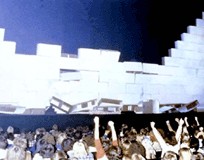 By
The Trial, it was Roger on stage alone contemplating his fate against
the animated court. There the brutal judge dredged up the characters in
Pink's life before him and demanded The Wall be torn down, exposing all
of Pink's frailty and fears in full view. Images flashed on The Wall in
rapid sequence as the first few bricks tumbled down onstage. The rumble
grew louder until the entire edifice came crashing down in systematic
chaos. By
The Trial, it was Roger on stage alone contemplating his fate against
the animated court. There the brutal judge dredged up the characters in
Pink's life before him and demanded The Wall be torn down, exposing all
of Pink's frailty and fears in full view. Images flashed on The Wall in
rapid sequence as the first few bricks tumbled down onstage. The rumble
grew louder until the entire edifice came crashing down in systematic
chaos.
During Outside The Wall, the
minstrels of doom armed with acoustic guitars, a mandolin, an
accordian, and Waters puffing on a clarinet, marched through the rubble
in the final act, proclaiming "it's not easy banging your heart against
some mad bugger's wall".
The show was presented in
February 1980 seven times at the Los Angeles Sports Arena, five times
at the Nassau Coliseum in New York, and then shown five times at
London's Earls Court in August 1980. In February 1981, eight times at
Westfalenhalle in Germany and five more times in June at Earls Court
that year, for a total of 30 performances. The later dates were
specifically held to allow filming of the concert. Due to the sheer
mass of equipment and logistics, this was the entire Wall Tour.
Filming of the June 1981 Earls
Court shows was an attempt to capture the event on celluloid. The
resulting concert footage was to be an integral part of a full scale
motion picture of The Wall. A script had been completed and shooting
had begun in September at Pinewood Studios in Buckinghamshire. It has
been said the resulting footage was dismal and substandard, so an
alternate plan was set in motion to turn the script into a surreal
visualisation.
Footage of the Earls Court
concerts does indeed exist and Roger is on record saying one day he
might release it as a historical document of the event. In the
meantime, only Roger Waters can sip warm beer and feast on toasty
popcorn to it. Perhaps one day we will see it?
A few negatives came from The
Wall. The band lost money after footing the bill and counting the
profits. Richard Wright by this time was on a salary since he was no
longer a member of Pink Floyd, so he made money from the shows. And the
band took a slashing by some of the press in reviews, as expected, but
all stumbled around their muddled brains trying to describe the event.
Floyd's legions of fans, the fortunate ones who saw the shows, saw this
as Floyd's ultimate performance. Now in retrospect, it would be the
pinnacle of an illustrious concert legacy.
|
 Articles
Articles  The Wall
The Wall  The 1980/81 Wall concert performances in detail
The 1980/81 Wall concert performances in detail







 "Whoa,
whoa, whoa, stop, stop, stop the film! We've decided the best thing
would be is to put this fire we have up here out!" These were Roger
Waters' impassioned words as he froze the premier Wall show at the Los
Angeles Sports Arena. Ashes falling from above were not just another
special effect, instead the curtains were smoldering from the battery
of fireworks punctuating the opening of "In The Flesh".
"Whoa,
whoa, whoa, stop, stop, stop the film! We've decided the best thing
would be is to put this fire we have up here out!" These were Roger
Waters' impassioned words as he froze the premier Wall show at the Los
Angeles Sports Arena. Ashes falling from above were not just another
special effect, instead the curtains were smoldering from the battery
of fireworks punctuating the opening of "In The Flesh". In
one man's soul this live concert experience was akin to a battleground,
a mass of humanity swirled into a dervish frenzy by the primitive pulse
of Rock'n'Roll. In his reaction to the war-zone and the dehumanization
that occurs at such events, The Wall expressed his concern that the
messages and emotions painted in Pink Floyd's music were getting lost
in the event's grand scale. A spectacle he himself helped create as the
group's popularity grew well beyond the hushed reverence fans used to
give them in the old days.
In
one man's soul this live concert experience was akin to a battleground,
a mass of humanity swirled into a dervish frenzy by the primitive pulse
of Rock'n'Roll. In his reaction to the war-zone and the dehumanization
that occurs at such events, The Wall expressed his concern that the
messages and emotions painted in Pink Floyd's music were getting lost
in the event's grand scale. A spectacle he himself helped create as the
group's popularity grew well beyond the hushed reverence fans used to
give them in the old days. tape
machines with music and sound effects (four to play and one to record),
Midas mixing consoles with 116 input channels and rack upon rack of
signal processing and special effects units requiring six engineers to
operate. Floyd sound aces James Guthrie and Chris Thomas headed the
sound production team.
tape
machines with music and sound effects (four to play and one to record),
Midas mixing consoles with 116 input channels and rack upon rack of
signal processing and special effects units requiring six engineers to
operate. Floyd sound aces James Guthrie and Chris Thomas headed the
sound production team. An
eighty man crew acted on cue to keep the performances in sync, as most
performances clocked right in near two hours. Each venue had mobile
offices and a crew canteen moved in to provide nurishment on-site.
David was musical director with a stack of music and sound effect cues
while Roger, armed with a wireless microphone, was in character as
Pink. All of this in more controlled and smaller venues as Roger liked
it. The Floyd and their crew managed to turn over 100 tons of equipment
into rock theatre far surpassing even their own past achievements.
An
eighty man crew acted on cue to keep the performances in sync, as most
performances clocked right in near two hours. Each venue had mobile
offices and a crew canteen moved in to provide nurishment on-site.
David was musical director with a stack of music and sound effect cues
while Roger, armed with a wireless microphone, was in character as
Pink. All of this in more controlled and smaller venues as Roger liked
it. The Floyd and their crew managed to turn over 100 tons of equipment
into rock theatre far surpassing even their own past achievements. Roger
later contended Willie Wilson was needed onstage to help Nick keep time
and Peter Woods was the additional keyboardist alongside Richard
Wright. This instrumental prowess gave the music a fully refined sound,
very evident on Another Brick In The Wall Part 2 as a 30 foot tall
teacher puppet danced from the rafters while Pink Floyd played an
extended version of the song.
Roger
later contended Willie Wilson was needed onstage to help Nick keep time
and Peter Woods was the additional keyboardist alongside Richard
Wright. This instrumental prowess gave the music a fully refined sound,
very evident on Another Brick In The Wall Part 2 as a 30 foot tall
teacher puppet danced from the rafters while Pink Floyd played an
extended version of the song. In
the second half, The Wall stood completed, vast, cold and impenetrable.
Hey You was sung behind the wall as a plea for contact as the worms of
moral decay have begun to eat into the nerve fibres of Pink's sanity.
The Wall opened up during Nobody Home to reveal a complete hotel room
for Roger's acting and reflection. High atop The Wall, David played his
blistering guitar solo in Comfortably Numb as his immense shadow was
cast across the audience. Again, the Master of Ceremonies came out to
introduce the band for In The Flesh, now with the full band back in
front of The Wall complete with a new hanging lighting rig. Later, for
Run Like Hell, a dark pig with search-light eyes loomed over the
audience with crossed hammers painted on its side.
In
the second half, The Wall stood completed, vast, cold and impenetrable.
Hey You was sung behind the wall as a plea for contact as the worms of
moral decay have begun to eat into the nerve fibres of Pink's sanity.
The Wall opened up during Nobody Home to reveal a complete hotel room
for Roger's acting and reflection. High atop The Wall, David played his
blistering guitar solo in Comfortably Numb as his immense shadow was
cast across the audience. Again, the Master of Ceremonies came out to
introduce the band for In The Flesh, now with the full band back in
front of The Wall complete with a new hanging lighting rig. Later, for
Run Like Hell, a dark pig with search-light eyes loomed over the
audience with crossed hammers painted on its side. By
The Trial, it was Roger on stage alone contemplating his fate against
the animated court. There the brutal judge dredged up the characters in
Pink's life before him and demanded The Wall be torn down, exposing all
of Pink's frailty and fears in full view. Images flashed on The Wall in
rapid sequence as the first few bricks tumbled down onstage. The rumble
grew louder until the entire edifice came crashing down in systematic
chaos.
By
The Trial, it was Roger on stage alone contemplating his fate against
the animated court. There the brutal judge dredged up the characters in
Pink's life before him and demanded The Wall be torn down, exposing all
of Pink's frailty and fears in full view. Images flashed on The Wall in
rapid sequence as the first few bricks tumbled down onstage. The rumble
grew louder until the entire edifice came crashing down in systematic
chaos.



